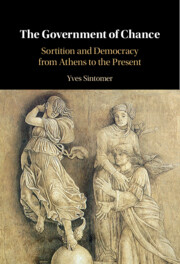16 results
1 - Democracy, Modern and Ancient
-
- Book:
- The Government of Chance
- Published online:
- 18 February 2023
- Print publication:
- 16 February 2023, pp 17-65
-
- Chapter
- Export citation
Tables
-
- Book:
- The Government of Chance
- Published online:
- 18 February 2023
- Print publication:
- 16 February 2023, pp ix-x
-
- Chapter
- Export citation
3 - The Disappearance of Sortition in Politics
-
- Book:
- The Government of Chance
- Published online:
- 18 February 2023
- Print publication:
- 16 February 2023, pp 125-187
-
- Chapter
- Export citation
4 - The Return of sortition
-
- Book:
- The Government of Chance
- Published online:
- 18 February 2023
- Print publication:
- 16 February 2023, pp 188-249
-
- Chapter
- Export citation
Index
-
- Book:
- The Government of Chance
- Published online:
- 18 February 2023
- Print publication:
- 16 February 2023, pp 309-314
-
- Chapter
- Export citation

The Government of Chance
- Sortition and Democracy from Athens to the Present
-
- Published online:
- 18 February 2023
- Print publication:
- 16 February 2023
Dedication
-
- Book:
- The Government of Chance
- Published online:
- 18 February 2023
- Print publication:
- 16 February 2023, pp v-vi
-
- Chapter
- Export citation
References
-
- Book:
- The Government of Chance
- Published online:
- 18 February 2023
- Print publication:
- 16 February 2023, pp 279-308
-
- Chapter
- Export citation
5 - Sortition and Politics in the Twenty-First Century
-
- Book:
- The Government of Chance
- Published online:
- 18 February 2023
- Print publication:
- 16 February 2023, pp 250-278
-
- Chapter
- Export citation
Acknowledgments
-
- Book:
- The Government of Chance
- Published online:
- 18 February 2023
- Print publication:
- 16 February 2023, pp xi-xii
-
- Chapter
- Export citation
Introduction
-
- Book:
- The Government of Chance
- Published online:
- 18 February 2023
- Print publication:
- 16 February 2023, pp 1-16
-
- Chapter
- Export citation
2 - Sortition’s Second Birth in the Middle Ages and the Early Modern Period
-
- Book:
- The Government of Chance
- Published online:
- 18 February 2023
- Print publication:
- 16 February 2023, pp 66-124
-
- Chapter
- Export citation
Note on the Text
-
- Book:
- The Government of Chance
- Published online:
- 18 February 2023
- Print publication:
- 16 February 2023, pp xiii-xiv
-
- Chapter
- Export citation
Copyright page
-
- Book:
- The Government of Chance
- Published online:
- 18 February 2023
- Print publication:
- 16 February 2023, pp iv-iv
-
- Chapter
- Export citation
Contents
-
- Book:
- The Government of Chance
- Published online:
- 18 February 2023
- Print publication:
- 16 February 2023, pp vii-viii
-
- Chapter
- Export citation
14 - Intellectual Critique and the Public Sphere: Between the Corporatism of the Universal and the Realpolitik of Reason
-
-
- Book:
- The Legacy of Pierre Bourdieu
- Published by:
- Anthem Press
- Published online:
- 05 March 2012
- Print publication:
- 15 April 2011, pp 329-346
-
- Chapter
- Export citation



